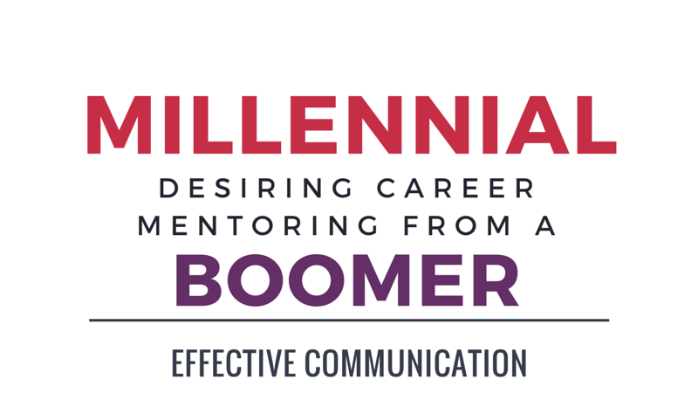A former student recently contacted me asking for career advice. She is working in public accounting as an associate at a top ten firm. Passing all her CPA exams on her first try, she is a rising star at her office with excellent performance reviews. She called to ask my opinion about how to communicate with her career coach. “I plan on telling my coach what I want out of my career. Either the firm needs to meet my needs, or I’m going to tell them I have to look for another company,” she said. Continuing, “My coach happens to be my direct report manager and is also a friend.” It was clear this alumna’s goals included looking for more opportunities that offered a more stable work schedule and cross training in another line of business with the firm. She also displayed characteristics typical of millennials in the workplace: needing to be heard, asking for structure, seeking purpose, and desiring friendship.
Being from the Boomer generation myself, I felt her approach was a bit too direct and self-oriented. So, I provided her with the following tips:
- Begin with your end goal in mind, but start with a question, not a demand. I suggested she ask her coach, “What skills and abilities do you see in me that could be used in other lines of business at our firm?” I suggested that the response she receives may be the answer she was looking for, or open her eyes to something of interest that she had not yet considered. By using this approach, the power remains with the coach, but the choice remains with her.
- Share your desires, but demonstrate loyalty to the firm. For instance, she could state, “Can you help me find opportunities, within the firm, for someone with my skills that provide more stable work hours?” This approach shows the coach her commitment to the firm and a willingness to align her desires with the firm’s needs.
- Express gratefulness for the opportunities you have had thus far and share how the work has provided purpose, but also express the potential benefits of a new assignment. Demonstrate how it will accelerate your sense of purpose and motivation with the firm’s mission. “I feel the work I’ve been doing for our major client is making a difference. How do those in another line of business find meaning in their work?” The doors should be open for meaningful options to employees who seek that purpose within the firm.
- Understanding the distinction between friendship and the transaction-based reality of manager-subordinate relationships. Treat this meeting as a mentor-mentee relationship as opposed to peer-to-peer. Save the small talk for after the work-related discussion. “Besides the strengths you’ve shared with me, please tell me the top two areas needing the most improvement if I am to advance at this firm?” Relationships are important for millennials, but compartmentalizing the roles are key to maintaining healthy boundaries. Develop comradery at work, but build the friendship after hours. It’s great to be able to work with others you actually enjoy as friends.
I love working with and mentoring millennials. They keep me feeling young and idealistic. A week later, I spoke to this alumna. She was excited to report that her conversation went well. She was offered an opportunity to transition to another line of business that met her needs. Her coach reinforced the firm’s commitment to help millennials build their careers.
The National Commerce Foundation recently published a great research-based resource regarding millennials and career development. For more information you may download at:
http://www.uschamberfoundation.org/sites/default/files/article/foundation/MillennialGeneration.pdf

